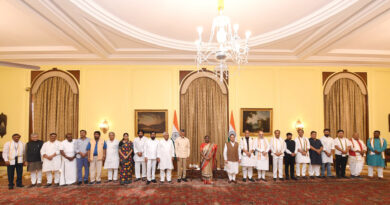AI & Blockchain Are Imperative, Not Optional: Dr. Jitendra Singh Calls for Strategic Utilization to Benefit Humanity at National Cybersecurity Conference
(Judicial Quest News Network)
In a powerful address at the National Conference on Cybersecurity, AI, and Blockchain, Union Minister Dr. Jitendra Singh emphasized that Artificial Intelligence (AI) and blockchain technologies are no longer mere options, but the essential tools for future progress. He stated, “The challenge now is not whether to adopt these technologies, but how to best utilize them for the greater good of humanity.” His words underscored the critical role these innovations play in shaping the future of India and the world.

Speaking at the PHD Chamber of Commerce and Industry event, Dr. Singh reflected on his ongoing involvement with the conference over the past seven years. He highlighted the importance of such platforms that allow for constructive dialogues on overcoming the pressing challenges facing both the government and society in this rapidly evolving technological landscape.
Dr. Singh recognized cybersecurity as a global issue, noting that India is no exception to the challenges posed by the rapid growth of next-generation technologies. Acknowledging the swift technological advancements of the past decade, he credited Prime Minister Narendra Modi’s vision of innovation and technological progress for driving India’s remarkable strides. However, he cautioned that technology, if left unchecked, can also become a weapon for malicious actors, with the potential to exploit advancements for nefarious purposes.
The Minister spotlighted some of the government’s pioneering initiatives aimed at improving citizens’ lives through innovative technological solutions. One notable example was the Department of Pensions, which became a trailblazer by using face recognition technology to issue Digital Life Certificates. This groundbreaking initiative allows pensioners to authenticate their identity and receive their certificates without the need to visit banks or government offices, thus enhancing convenience and accessibility.
Turning to the relationship between AI and human oversight, Dr. Singh argued that while AI can be a powerful tool for assisting humans, it should never replace human involvement. He cited the example of the Department of Administrative Reforms and Public Grievances (DARPG), where AI has significantly improved the grievance resolution process through the CPGRAMS portal. However, he emphasized that despite a 95% grievance resolution rate, there were still instances where citizens felt dissatisfied. In response, the government introduced a “Human Desk” in December 2023 to address such concerns, reinforcing the need for human emotional intelligence alongside technological tools.
Dr. Singh also discussed the government’s commitment to collaborating with non-governmental players and the private sector to tackle emerging technological challenges. He highlighted the recently approved Bio e3 policy, which is designed to help India navigate global economic shifts and position itself as a significant contributor to the global economy. Additionally, he referred to the Anusandhan National Research Fund (NRF), which reduces the nation’s reliance on government funding by encouraging private sector investment in research and development.

Reflecting on the rise of India’s start-up ecosystem, Dr. Singh noted that the country has seen an exponential increase in start-ups, growing from just 350 to nearly 1,900 in the past decade. He stressed the importance of synergy and collaboration between all stakeholders—government, industry, and academia—to address emerging threats, combat antisocial elements, and advance India’s goal of becoming a ‘Viksit Bharat’ (developed India) by 2047.
The conference also featured insights from key industry leaders, including Shri Rajesh Kumar Pathak, Secretary of the Technology Development Board, Department of Science and Technology, Shri Ashok Mutha Jain, IPS, ADG of Uttar Pradesh Police, and Anuj Agarwal, Chairman of the Centre for Research on Cyber Crime and Cyber Law. Dr. Neha Berlia, Chair of the Task Force on Digital Security, also contributed to the session online.
The event served as a vital platform for discussing the future of technology and cybersecurity in India, setting the stage for continued collaboration and innovation to tackle challenges and seize opportunities in the realms of AI, blockchain, and beyond. Dr. Singh’s remarks reaffirmed that the strategic use of emerging technologies will be crucial to India’s development and global leadership in the years ahead.



